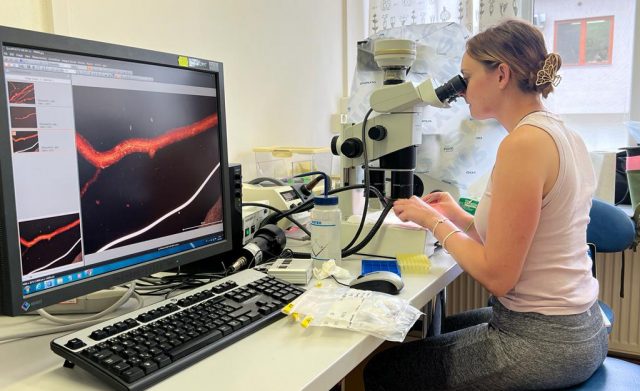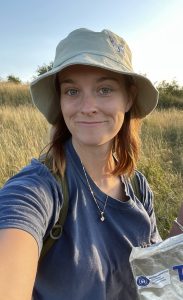
UM doctoral student Savannah Draud conducts research in the Department of Biology. Draud, who teaches introductory biology labs, also works with Oxford-area high school students to increase their science literacy. Submitted photo
OXFORD, Miss. – Savannah Draud, a doctoral student in biology at the University of Mississippi, is spending time at local high schools to help increase science literacy in an effort to inspire students to further their education and foster a love of science, technology, engineering and mathematics subjects.
The Long Island, New York, native, who teaches introductory biology labs at UM, noticed that her students were having issues with an assignment that asked them to read and summarize a scientific paper.
“I noticed that my students were struggling with that project because they’ve never seen a scientific paper before, and reading that kind of literature is a lot different than reading a normal book,” Draud said.
That observation is what guides the aspiring college professor’s lectures at the high schools, where she speaks to pre-AP biology, AP biology, human anatomy and physiology, and chemistry classes.
“My idea is to go to the high schools here and teach biology classes scientific literacy skills – how to read these kinds of papers and then also how to have discussions about those papers,” she said. “The students can ask about anything – it can range from the specific paper we’re talking about to issues of gender or underrepresented communities.
“Studying science can lead to good scientific and philosophical discussions.”
The talks pique the interest of high school students because they allow the students to explore things they’re curious about.

Savannah Draud works with Oxford-area high school students to increase their science literacy in hopes of inspiring them to pursue careers in STEM fields. Submitted photo
“Just last week, I had one group of students that were excited to ask me the most random biology questions,” Draud said. “They were shooting off random questions like, ‘Oh, what do you think goes through the mind of a bear when it decides to attack you?’ and ‘Do jellyfish count as a real animal?’
“I could tell that they were interested and actually listening to what I had to say when I was explaining it through a scientific lens.”
Draud invites her Ole Miss peers to join her in the classroom so that students can hear from a variety of research perspectives.
“It is like a tiered mentorship program, where people from all different levels studying science come and talk to the students about what they do,” she said. “A lot of my fellow Ph.D. students and master’s students have their own research published already, so I ask them to come in and talk about their research so that the high school students have a chance to talk to the actual scientists who do the work.”
Draud’s enthusiasm for science shows through her lectures and students look forward to her visits, said Jeana Noble, biology teacher at Oxford High School.
“Not only were my students able to ‘drop their shoulders’ a bit as she simplified the process of dissecting a scientific article, but she also gave them real-world connections,” Noble said. “Her personal experiences of success and failure taught them that you can learn as much from failing as succeeding. What an awesome opportunity for my students.”
Creating and maintaining without any funding is an impressive achievement for a doctoral student, said Sixue Chen, chair of the UM Department of Biology. Chen and Draud have been working on ways to expand the program’s teachers, funding and reach moving forward.
“As one of the nation’s poorest states, Mississippi has a large population living in poverty and food insecurity,” Chen said. “The disproportionally affected people are often underrepresented minorities and disadvantaged communities.
“One effective way to lift people out of poverty is pursuing higher education – getting more and more high school students excited about science and wanting to attend college is life-changing for many people, and thus, is especially important for Mississippians’ future.
“My dream is to have an inspiring young scientist like Savannah in every Mississippi school.”